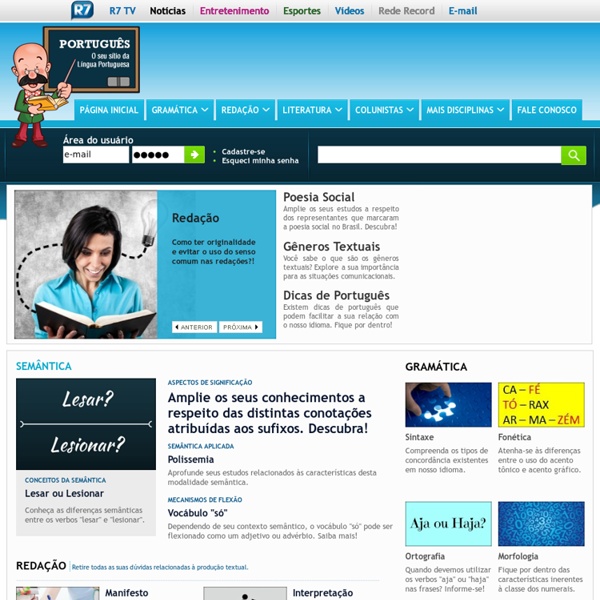



Gramática on-line: português para concursos Money vocabulary in Portuguese | Portuguese Language Blog Posted on 03. Sep, 2012 by Adir in Vocabulary Oi! Começamos setembro com uma lista muito útil de palavras e expressões relacionadas ao dinheiro. Estão prontos? Moeda corrente – currency O real é a moeda corrente no Brasil. Emprestar – to lend Você poderia me emprestar cinquenta reais? Taxa de caâbio – exchange rate Vamos esperar por uma taxa de câmbio mais favorável. Empréstimo – loanQuitar – to pay off Os irmãos Ferreira querem fazer um empréstimo para quitar suas dívidas. Poupança – savings account Você já pensou em abrir uma poupança? Conta corrente – current account Fazer um cheque – to make out a check Cheque nominal – order check Você poderia fazer um cheque nominal a “Adir Ferreira” por favor? Cheque administrativo - certified check Se você não confia no comprador, peça um cheque administrativo. Caixa automático – ATM Você sabe se tem um caixa automático por aqui? Sacar dinheiro – to withdraw money Tenho que sacar dinheiro da minha conta para fazer uns pagamentos. Tags: Vocabulary
Mathematical Treasures SEJA BEM-VINDO! "Tupi or not tupi, that´s the question." - Oswald de Andrade (1928) Que bom que você também tem interesse especial pela língua portuguesa! Agora o universo das letras vai fasciná-lo ainda mais. É verdade: o mundo das palavras é um campo vasto, mas pode ser facilmente trilhado por aqueles estimulados pela curiosidade e pela vontade de conhecer sua própria língua. O nosso objetivo é oferecer a você alguns "atalhos" para conquistar este mundo. Para isso, a Minigramática apresenta uma série de normas cultas do bem escrever e do bem falar. Através da Minigramática você poderá conhecer as Classes Gramaticais, os Termos da Oração, e alguns fenômenos da linguagem, como a Concordância, a Regência Verbal, a Colocação Pronominal, entre muitos outros. Esperamos contar com o seu entusiasmo sempre maior pela língua portuguesa.
Portuguese Slang Slang and idioms are colourful words and expressions that cannot be translated literally. They are absolutely indispensable if you want to speak like a native, it's the difference between "textbook" and "real- world" language. top ^ Os 10 melhores sites e blogs de Gramática do Brasil | O novo modelo do Enem, assumido desde 2009, tem como um de seus fortes argumentos o rompimento da quantidade de conteúdo exigido nos vestibulares tradicionais, valorizando a capacidade de interpretação e a interdisciplinaridade dos estudantes. Entretanto, observamos que os estudantes com melhor classificação no exame ainda são aqueles que acumularam, ao longo do ensino médio, uma enorme carga de informação. Ou seja, a receita para o sucesso no Enem, por mais que este venha revolucionando a forma de acesso às universidades, continua a mesma: muito estudo e leitura. Pensando nisso, e de olho nos conteúdos que o MEC ressalta que são cobrados no Enem, o InfoEnem iniciou no mês de fevereiro uma série de publicações semanais que destaca os 10 melhores sites e os 10 melhores blogs de cada disciplina. Assim separamos devido as diferentes propostas. Os sites trazem os conteúdos mais fixos. Hoje é o dia da Gramática. Os 10 melhores sites de Gramática do Brasil: Veja também:
Portuguese verb conjugation Toda a obra poética de Fernando Pessoa para download Veja também O portal Domínio Público disponibiliza para download a poesia completa de Fernando Pessoa. Embora sem uma ordem cronológica adequada e com edições repetidas, o acervo contempla toda a obra conhecida do poeta português. Fernando Pessoa nasceu em Lisboa, em junho de 1888, e morreu em novembro de 1935, na mesma cidade. É considerado, ao lado de Luís de Camões, o maior poeta da língua portuguesa e um dos maiores da literatura universal. Seus poemas mais conhecidos foram assinados pelos heterônimos Álvaro de Campos, Ricardo Reis, Alberto Caeiro, além de um semi-heterônimo, Bernardo Soares, que seria o próprio Pessoa, um ajudante de guarda-livros da cidade de Lisboa e autor do “Livro do Desassossego”, uma das obras fundadoras da ficção portuguesa no século 20. Além de exímio poeta, Fernando Pessoa foi um grande criador de personagens. Álvaro de Campos, por exemplo, era um engenheiro português com educação inglesa e com forte influência do simbolismo e futurismo.
Learn Portuguese with free online lessons Dicionário de Português | Michaelis Apresentação A elaboração do Michaelis Moderno Dicionário da Língua Portuguesa estendeu-se ao longo de dez anos e contou com a dedicada colaboração de 84 profissionais especializados. Com esta publicação, a Melhoramentos reafirmou sua tradição na edição de dicionários de qualidade, oferecendo ao público uma grande e imprescindível obra de referência que renovou as possibilidades de estudo, conhecimento e uso correto de nossa língua. Este dicionário, com mais de 200.000 verbetes e subverbetes, foi planejado com extremo rigor lexicográfico, procurando-se registrar o maior número possível de vocábulos, tanto da linguagem escrita quanto da oral. Especial ênfase foi dada ao registro de novas palavras que surgiram com o desenvolvimento das ciências e da tecnologia, além da inclusão dos neologismos da linguagem padrão, dos regionalismos, da gíria e do baixo calão.
Conjugador de Verbos da Língua Portuguesa Exemplos de verbos para conjugar: amar ; haver ; ir ; querer ; por ; saber ; ser ; ter ; usar ; ver ; vir ; Interface criada pelo Grupo de Linguística da Insite Visite o Blog e álbum de fotos do Grupo de Linguística da Insite